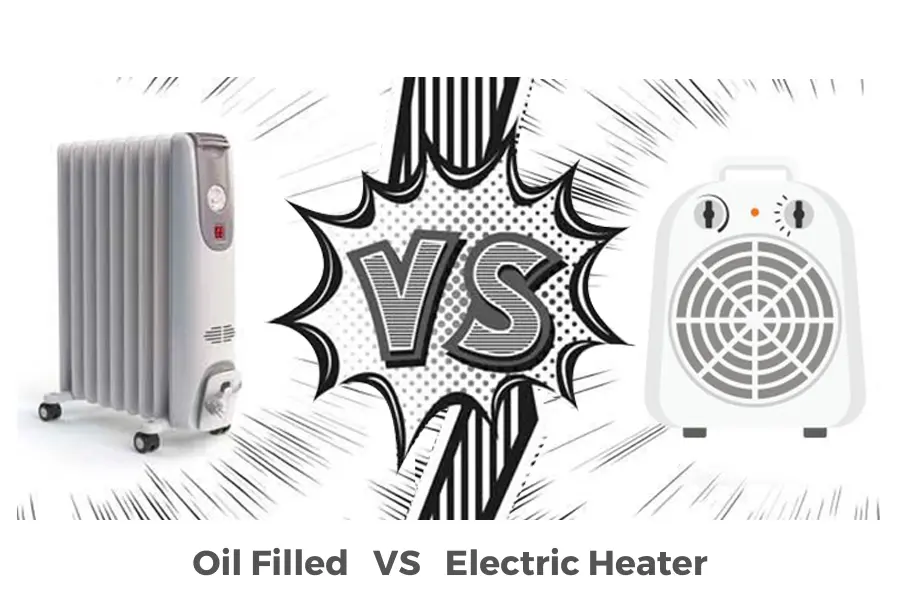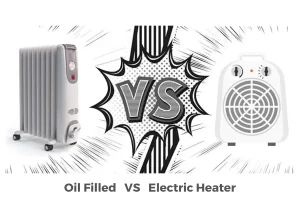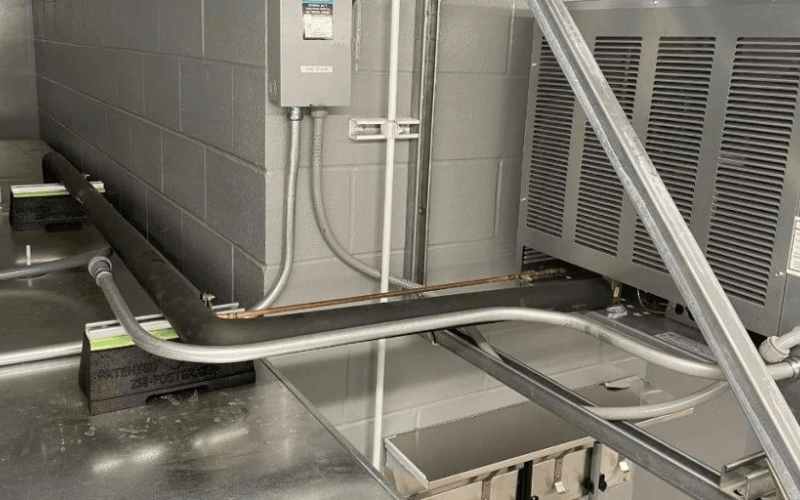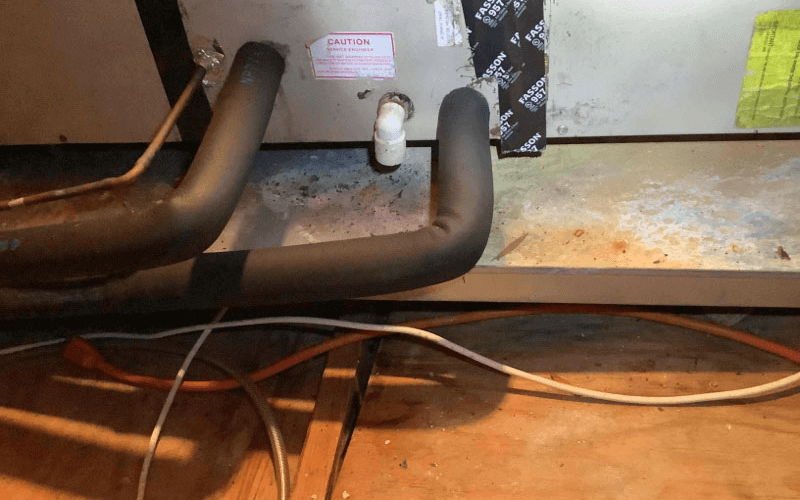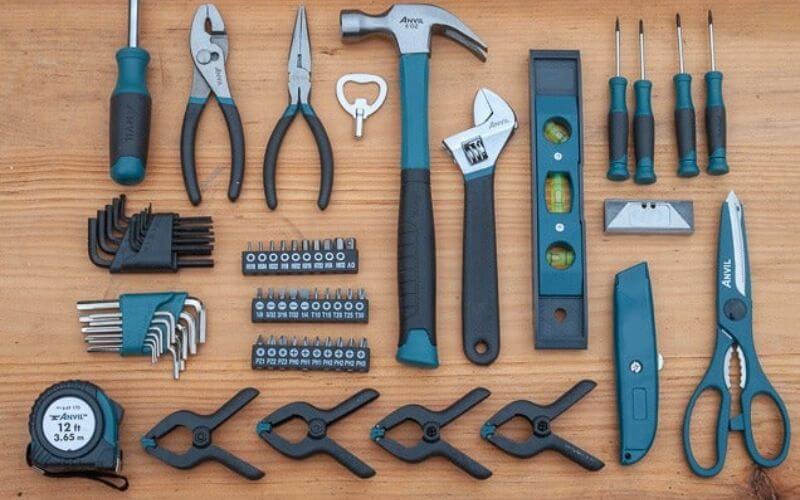During extreme winters, your home may require an additional heat source. When winter temperatures drop below freezing, you may need extra help to keep you warm indoors. This is where Electric Heater come to the rescue.
Buying a heater that meets your room temperature needs while saving on your bill can be challenging. Quickly solve your heating problem and make your space warm and cozy outside the bitter cold.
Table of Contents
ToggleChoosing the best heater from the many options available can be difficult. You’ll need technical knowledge for this. It can otherwise become overwhelming. We’ve put together a complete guide to oil-filled vs. oil-filled pros and cons. Electric Heaters to help you better understand which heater is best for your heating problem.
Also check: Infrared Heaters vs Ceramic Heaters
Oil Heaters:
Oil heaters are also known as oil radiators or oil heaters. Oil heaters, as the name implies, do not use oil to generate heat. Diathermic oil is used as a reservoir rather than as a fuel.
A heating element at the radiator’s base converts electricity into heat, whereas an oil-filled radiator draws cool air from the surrounding environment and returns it through thin fins. This process makes use of thermal radiation and convection.
Benefits of Oil-Filled Electric Heaters:
To compare oil-filled and electric heaters, we will list the benefits of oil-filled space heaters.
Energy Efficient:
Oil heaters save energy and help to reduce power consumption. When heated oil is switched off, it retains and continues to warm.
Only the oil is heated by electricity, not the entire room. Heat is provided by heated oil without electricity, saving several dollars per unit.
Work Well In Small Spaces:
Oil-filled heaters are the way to go if you want a heater that works well in small to medium-sized enclosed spaces like bedrooms, garages, living rooms, and office cubicles. Unlike electric heaters, which heat and cool quickly, oil heaters heat a small area for an extended period.
Silent:
Electric heaters, particularly fan heaters, frequently make a constant noise. When attempting to sleep, this noise can be distracting. Conversely, the oil heater is fanless and produces no noise due to convection heating. As a result, they are preferred.
Portable:
The bottom of most modern oil-filled heaters has wheels. These wheels are lightweight and easy to maneuver. These heaters can be easily placed in any room without requiring manual transport.
Keep the Air Humid and Clean:
Oil radiators have a reputation for keeping the environment clean and moist. In contrast to electric fan heaters, notorious for sucking moisture out of a room, oil-filled radiators provide consistent airflow without drying out the area.
Your health will be unaffected, and the room will remain warm for longer.
Safe:
Walking around the house near an electric stove can be dangerous for children. Because electric heaters produce a high amount of heat, heated surfaces are hazardous. Touching the surface by accident can cause skin burns.
Oil radiators, on the other hand, have columns that heat up less and protect the skin from burns. So, if you have children, you’ll know which heater to use.
Cons of Oil Heaters:
Oil radiators, like any electrical device, have drawbacks that should be considered before purchasing.
Expensive:
Electric heaters are less expensive than oil heaters. The technology is new and costly because it uses convection heating with dielectric oil.
Nonetheless, these heaters save energy over time. This means you’ll be charged less money in the future.
Electric heaters are less expensive than bulky oil heaters. The technology is new and costly because it uses convection heating with dielectric oil.
Nonetheless, these heaters save energy over time. This means you’ll be charged less money in the future.
Take Time to Heat up:
Unlike other electric heaters, oil-filled heaters consume much time. For instant warmth, an oil-filled radiator may not be a viable option. Once heated, it takes a long time to cool.
Electric Heaters:
A heater that converts electrical energy into thermal energy is known as an electric heater. They have an electrical resistance that converts current into heat energy. Electric heaters include infrared, convection, and fan heaters.
Advantages of Electric Heaters:
Despite their popularity, electric stoves have some advantages over oil heaters. We’ll go over them in more detail later.
Inexpensive:
Because they use simpler technology, most Electric Heaters are less expensive than oil-filled heaters. Fan heaters are nearly half the price of oil heaters, allowing you to save money on your purchase.
Heat Up Fast:
Electric heaters are excellent for rapidly heating a room. This is an advantage over oil-filled heaters, especially if you’ve been away from home for a while and need a heater to warm you up quickly on chilly nights.
Ideal For Large Areas:
Large labs, warehouses, and office floors benefit from electric heaters. Even the longest room takes significantly less time to heat. On the other hand, oil-filled heaters take longer to heat up and may not work efficiently over large areas.
Cons of Electric Heaters:
Customers must also be aware of the shortcomings of their devices to make an informed decision. I’ve listed some disadvantages of electric heaters for your convenience.
Do Not Retain Heat:
Because electric heaters use heat conversion technology, they can only provide instant or spot heating. While this may appear advantageous, the downside is that when the heating is turned off, the room cools as quickly as it warms.
Increase Your Electricity Consumption:
Electric heaters are expensive to operate. A typical fan heater has an energy output of 2000-3000 watts. They lose heat at the same rate they heat their surroundings. As a result, you must allow them to run for an extended period.
Lack of a Thermostat:
Most electric heaters lack thermostats. You cannot control the heat to maintain a constant room temperature when using an electric stove.
Cause Noise Pollution:
Electric fan heaters are noisy. As the fan rotates, it creates noise pollution in the room, which may irritate many people.
They May Cause Health Concerns:
Electric fan heaters are extremely loud. The fan generates noise pollution in the room, which may irritate some people.
They May be Harmful to One’s health:
Radiant electric heaters may be hazardous to your health. Breathing difficulties, allergies, and asthma are all caused by poor air quality.
FAQ
What is the difference between an oil vs electric heater?
The difference between oil and electric heaters is that oil heaters are efficient, the heat lasts longer, and they are very quiet. In contrast, electric heaters provide heat quickly, are lightweight and easy to carry, and can direct heat directly.
How efficient are oil-filled electric heaters?
Oil-filled space heaters are also over 99% energy efficient. Unlike gas stoves that burn propane or natural gas, nearly all the electrical power consumed by an oil-filled space heater is converted directly to heat.
Can you leave an oil-filled heater on all the time?
In general, kerosene stoves can be left overnight without hesitation. The main reason is that there are no exposed heating elements. It is designed so that the surface does not get too hot. It also has a toggle switch and a built-in timer to turn the heating off under certain circumstances, reducing the fire risk.
Also check: The 5 Most Reliable, Efficient, and Best Furnace Brands of 2022
Conclusion:
There are numerous distinctions between oil heaters and electric heaters. When purchasing a heater in the winter, you should make informed decisions. Electricity powers both types of heaters. As a result, consider energy consumption and efficiency before making a purchase.
Furthermore, the choice is determined by the room size in which the heater will be installed. There are no right or wrong choices. Remember that there are only wise options. So make the best decisions you can.

